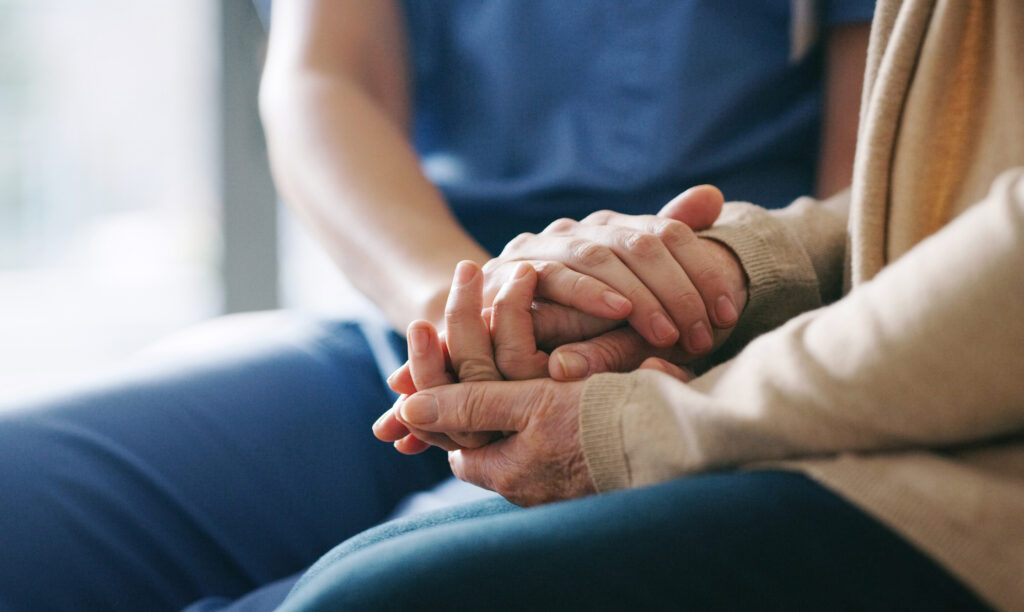
As caregivers, we often suffer a loneliness that is unique to those of us who do this difficult work. It’s important to engage in caregiver support steps to maintain your own health during this time.
As I travel around WNY visiting caregivers, I find a certain commonality with all of our clients’ caregivers, that is, many of us, even if we live with the person we are looking after, have a house full of PCA’s, nurses, therapists and social workers feel alone.
I, like many of you, often think about my dreams of having an “extraordinary life”. What happened to these dreams that they are now reduced to hoping to have just a “normal” life?
To be clear, there are benefits to caring for a spouse, mom, dad, child or friend. It can provide a purpose in life and bring satisfaction that is unique to us.
I remember a line from the Broadway Musical “Les Miserable”; it goes like this, “To Love Another Person is to See the Face of God”.
Nonetheless we feel alone. Who are caregivers? Why do we feel alone, unappreciated, trapped, stuck? Why don’t others help us? Why don’t old friends visit?
Here’s my experience:
Friends drop off as time passes. Getting together as “couples” has really dropped off because many of our previous links to other couples can’t be accomplished now as a result of the situation.
My wife’s “girlfriends” rarely come by anymore and her children live out of town (we don’t have children together).
So, what do we do? What do I do to correct this situation?
As a caregiver I was inclined to think and say “I shouldn’t have to tell people that my wife is still the same person in spite of her stroke related deficits and you should visit, offer help…. etc.”
After a while however I swallowed my pride and reached out to friends and relatives and invited them to make regular visits and I call upon them for help when I need it. As a result, we have visitors! If some people don’t come, well maybe they were not as close to us as we thought.
I know it’s hard to do this, but once you get over the lump in your throat that is your pride, I think that you’ll find that it was worth it.
Recognize another caregiver. The reality is that the person receiving care gets most of the attention.
Whenever I’m out and about and see a person receiving care, whether they’re being pushed in a wheelchair, walking with a walker, looking after a disabled child, I make it a practice to focus on that person that is helping out, the caregiver. I approach that person and make certain to recognize them for what they do. Coming from another caregiver gives that recognition special meaning. It has led to many nice conversations, or maybe a simple “thank you”. Think of how you would feel if someone approached you in this way. Pay it Forward!
Caregiver Support Groups and Information
If you want to find other folks in ‘our shoes’, you might want to participate in a support group, where likeminded people gather to exchange ideas or simply to get away for a few hours.
Most counties’ websites have a section dedicated to caregivers and, within it, there may be a list of support groups in the area. Believe me, there is a support group for any condition that you can imagine; most of them meet on a monthly basis and some are online support groups.
Another great way to meet other caregivers is educational participation in classes like “Powerful Tools for Caregivers”, classes I personally attend and lecture at. They are usually sponsored by county departments of senior services.
Here are some Care Partner and Caregiver Support Resources:
- Erie County – Erie County Caregiving Guide
- Niagara County – Niagara County Caregiver Resources
- Lockport – The Dale Association offers a variety of services for Care Partners
- Chautauqua County- Chautauqua County Caregiver Support Services
- Cattaraugus County – Cattaraugus County Caregiver Support
- Genesee County – Genesee Caregiver Support
- Monroe County – Monroe County Caregiver Assistance
- Wyoming County – Wyoming County Caregiver Support
- Steuben County – Steuben County Caregiver Resource Center
- Alleghany County – Alleghany Caregiver Support
If loneliness persists…
We urge you to try some of the strategies outlined in this issue. If loneliness leads to depression, anxiety and unusual stress over an extended period, you may want to consider professional help in the form of personal or group counseling.
The websites for your county’s Office for the Aging may contain resources for obtaining help. If there is no direct link to counseling services, just call, it’s their job to help!
Celebrity Caregivers
Old age, illness, accidents do not discriminate. Even the wealthiest and most famous among us are looking after loved ones. While it is true that many of the “Rich and Famous” have the resources to get all of the physical services that their loved ones need, they still are subject to the same worry and concern that we face.
Here are some celebrities that have been and/or are still are caregivers:
- Patrick Dempsey – Mom with Ovarian Cancer
- Leeza Gibbons – Mom with Alzheimer’s
- Hillary Clinton – Mom with Alzheimer’s
- Maria Shriver – Dad with Alzheimer’s
- Nancy Reagan – Husband with Alzheimer’s
- Rob Lowe – Dad with Cancer
- Baldwin Brothers – Mom with Breast Cancer
- Rosalynn Carter – Cared for Mom and Dad
- Henry Winkler (The Fonz) – Mom with TBI
- Seth Rogen – Mother In Law with Alzheimer’s
You can read about these caregivers and others by typing their names in your search bar or Google: “21 Inspiring Celebrity Caregivers” or www.babble.com.
Thank you for reading and please, never hesitate to email me with your caregiver questions at rpokorski@ventureforthe.com. I’m always happy to hear from fellow-caregivers who I may be able to help, have previously helped, or who have ideas for future topics on this blog!
Take care,
Ron Pokorski
Caregiver Consultant
For more information about caregiving options, visit our care coordination page.
